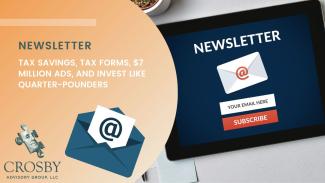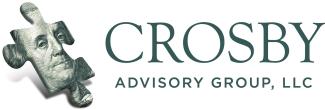
Tax savings, tax forms, $7 million ads, and invest like quarter-pounders
Donor-Advised Funds Can Turbo Charge Tax Savings
If you make charitable donations, a donor-advised fund may help you enhance your tax savings. Often charitable-minded people make donations to their favorite charity by writing a check or cash with after-tax money. A donor-advised fund may help you double your tax savings. How does it work?
We set up a donor-advised fund that allows you to transfer securities from your investment account to the fund. While you are not required to, ideally, the investor would transfer securities held outside IRAs that have unrealized capital gains. This can allow the investor to:
- Avoid capital gains charitable on the security
- Take an immediate deduction
You can save on taxes twice while helping out the charity of your choice. Additionally, donating securities to a donor-advised fund simplifies record keeping as it only requires you to keep records of contributions made to the fund. Keep in mind that to receive the benefit of a charitable donation a taxpayer must exceed the standard deduction offered by the present tax code, thus not all taxpayers receive a tax break for making donations to IRS-approved charities. A well managed donor-advised fund can also make sure the charity of your choice is approved by the IRS for tax-deductible charitable contributions.
When are 1099 investment tax forms released?
- SEI: February 15th
- Charles Schwab: February 17th
After those dates, you can receive the forms faster by logging onto your online account or signing up for e-delivery.
Super Bowl ads going for $233,333 per second!
There is no debating what American sport draws the most viewership, and thus the most ad dollars. If you want to advertise your business during this year's Super Bowl, it would cost $7,000,000 for a thirty-second spot. What must marketing teams do to make that investment worth it? We interviewed our marketing expert Carly Snyder to get her insight. You can listen to the full interview here.
Secret to Investing: Buy Investments Like You Would a Cheeseburger
I have a confession. I love McDonald’s Quarter Pounders (almost as much as I love McDonald’s stock). I rarely eat them though. In fact, I usually save the wonderous occasion to enjoy one for a special event, perhaps a cross-country vacation with my family or a particularly great day at work. Last week I traveled to Oaks, PA and spent two days at SEI Private Trust Company headquarters, meeting with several of their investment managers. Somewhere in the Pennsylvania mountains on Interstate 76, I crested a summit and saw golden arches ahead. It was just after 11:00 AM, I was the only patron at the order counter which had no employee behind it. After a few moments, a young girl wiping down tables saw me standing there and ran over to take my order. “Two quarter pounders please.” It was going to be a good day. “That will be $11.35.” I placed my card in the reader and while I was waiting for it to process the young girl said, “I’m suddenly not looking forward to today.” “Why is that?” I asked. “People are going to be upset. For the past week, we were running a special of 2 quarter pounders for only $6.00. People are going to be mad at me because that deal is over.” As she went back to package up my burgers, I thought about what she said. On the surface that seemed like a small problem. Certainly not big enough to let it ruin your day. It's not like she would force them to buy one (or two), plus the menu offered many other lower-cost choices. Her problem seemed like a Happy Meal. I had spent the entirety of 2022 trying to keep nervous investors in their seats as all major asset classes struggled, and I couldn’t even offer them a quarter pound of delicious cheeseburger! The truth is our challenges are no less real just because someone else may perceive them as small. Large or small, our challenges must be faced. I thanked her for taking her job so seriously and advised her to tell her customers not to fret, more deals on the Quarter Pounder will surely come. Until then, enjoy the rest of the menu.
As I drove away oblivious to the hundreds of miles that lay ahead of me because the aroma of all-American goodness filled my car, I realized there was an interesting investment lesson to be learned from that conversation. From 2010 to 2021, stocks were the main course; you bought them at any price, and they became more valuable. As long-term investors, we realize down years happen. A historical review of the S&P 500 reveals the stock market finishes up about 75% of the time. Thankfully the down years happen far less often than the positive years, but because of the pain associated with loss, it’s interesting to see how human emotion treats those down years. If we are a long-term purchaser of anything (hamburgers, clothes, cars, homes) there is a level of satisfaction when we get discounted buying opportunities. However, this feeling must be learned as it does not come naturally with investing. What studies and practice find is many investors are more confident funding their investment accounts when the investment markets are rising. Some investors go as far as to stop funding their accounts until the market begins to rise; forgoing the sale to purchase at full price. This is a dramatically different mindset than the average Quarter Pounder purchasers, who my helpful McDonald’s friend informed me are much happier to purchase the delicious cheeseburger when prices are falling.
Disclaimer: Crosby Advisory Group is a registered investment advisor. This newsletter is for informational purposes. Do not buy or sell a security just because it was mentioned in this newsletter. Investing involves risk including the potential loss of principal. Consider all risks and fees before investing. Crosby Advisory Group has ownership in CAG Marketing. Insurance products are sold and serviced through NMD Insurance.

